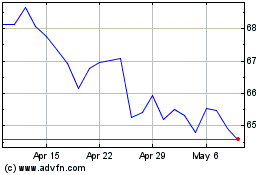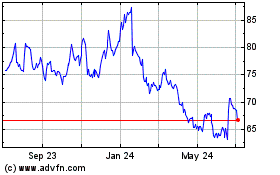Gilead Swings to Quarterly Loss on Higher Costs -- Update
July 30 2020 - 8:27PM
Dow Jones News
By Joseph Walker and Maria Armental
Gilead Sciences Inc. expects sales of its Covid-19 drug
remdesivir to help lift its full-year revenue by as much as $2.8
billion in 2020, offsetting the negative impact of the pandemic on
some of its other medicines.
The biopharmaceutical company began selling remdesivir, an
antiviral drug shown to help speed recovery times in hospitalized
Covd-19 patients, in July. It said Thursday it expects to sell one
million to 1.5 million treatment courses in the second half of the
year.
Chief Commercial Officer Johanna Mercier said a supply squeeze
because of disruptions to global supply chains was beginning to
ease.
By early October, "we should be in a place where global supply
meets global demand," Ms. Mercier said on a call with analysts
after the company reported second-quarter financial results.
Gilead has struggled to meet demand for remdesivir because of
the drug's complex manufacturing process, and supply chain
slowdowns resulting from pandemic lockdowns.
Gilead charges about $3,120 per patient in the U.S. and about
$2,340 per patient in Europe and other developed countries.
The company said it now expects its 2020 revenue to be in a
range of $23.3 billion to $25 billion, up from its previous
guidance of $21.8 billion to $22.2 billion.
The company also raised its outlook for adjusted operating
profit, which it now expects to be in a range of $10.7 billion to
$13 billion, up from its previous guidance of $10.1 billion to
$10.8 billion.
Evan Seigerman, an analyst with Credit Suisse, said Gilead's
revised revenue projection likely understates potential remdesivir
sales this year. After taking into account an estimated $1 billion
to $2.5 billion decline in sales of the company's other products,
Gilead's guidance indicates that remdesivir sales will be in a
range of $3 billion to $4.5 billion in 2020, Mr. Seigerman said in
a note to clients.
Covid-19 disruptions to routine health care reduced sales by
about $500 million in the first half of 2020, company executives
said Thursday. The company said reduced doctor visits brought down
the number of new patients starting some of its drugs, including
its antiviral drug Biktarvy and its prophylactic treatment Descovy,
which can prevent new HIV infections. But overall demand for the
drugs was still strong.
Gilead swung to a loss in the second quarter, driven by expenses
related to its acquisition of biotech company Forty Seven Inc. and
research and development for remdesivir. The company said expenses
more than doubled in the quarter to $8.13 billion, outpacing
revenue gains. The higher costs were largely related to clinical
trials and manufacturing ramp-up expenses related to
remdesivir.
Overall, Gilead reported a loss of $3.34 billion, or $2.66 a
share, compared with a year-earlier profit of $1.88 billion, or
$1.47 a share. On an adjusted basis, profit fell to $1.11 a share.
Revenue fell 10% to $5.14 billion.
Analysts surveyed by FactSet expected a loss of 69 cents a
share, or adjusted profit of $1.44, on $5.29 billion in
revenue.
The drugmaker had warned that about $200 million in sales had
moved into the March quarter, primarily in the U.S., as customers
stocked up on prescription medicines during the pandemic.
Sales of HIV drug Biktarvy, which more than doubled in the March
quarter, rose 44% to $1.6 billion in the second quarter.
Write to Joseph Walker at joseph.walker@wsj.com and Maria
Armental at maria.armental@wsj.com
(END) Dow Jones Newswires
July 30, 2020 20:12 ET (00:12 GMT)
Copyright (c) 2020 Dow Jones & Company, Inc.
Gilead Sciences (NASDAQ:GILD)
Historical Stock Chart
From Mar 2024 to Apr 2024

Gilead Sciences (NASDAQ:GILD)
Historical Stock Chart
From Apr 2023 to Apr 2024
